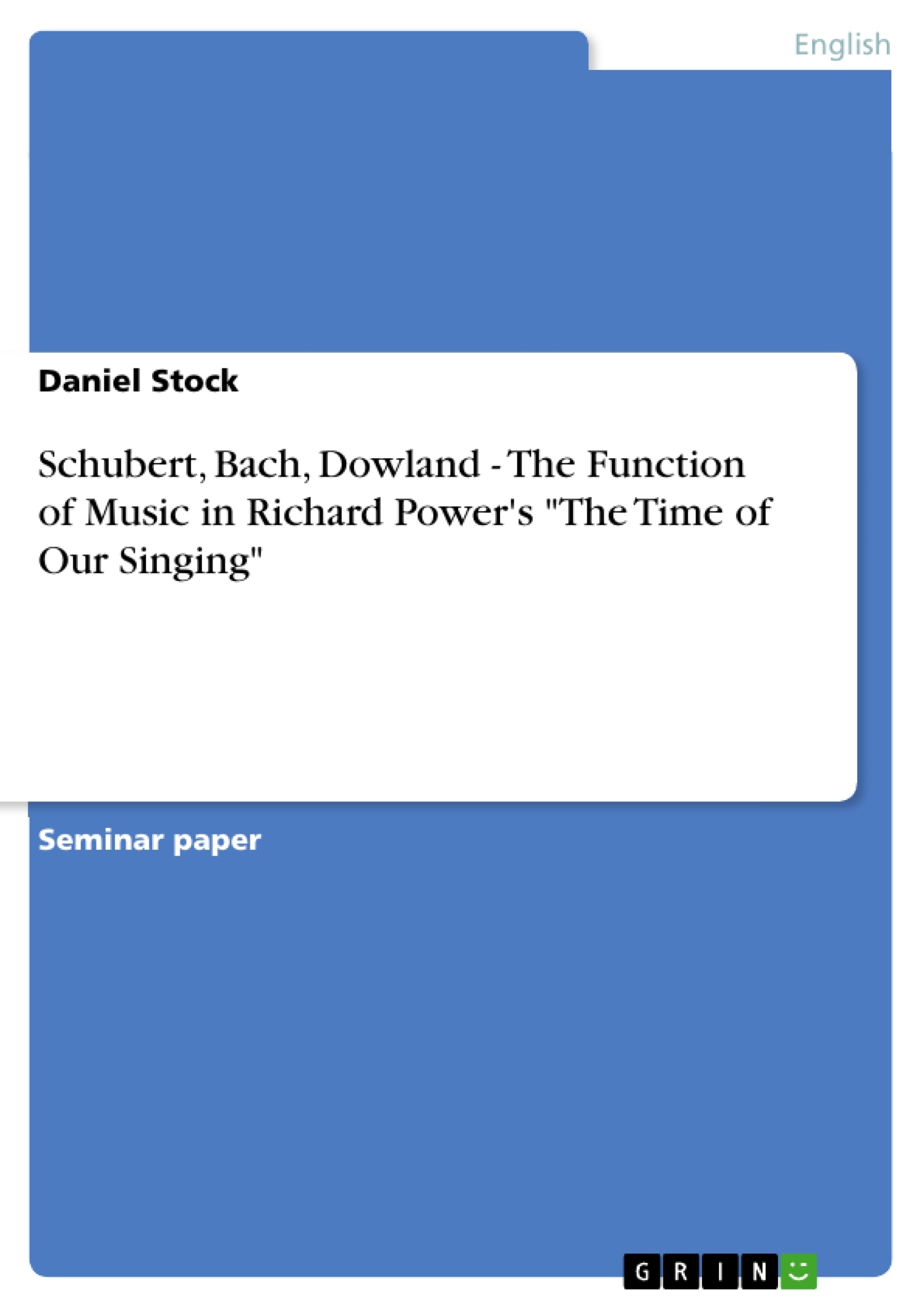Introduction
“I can′t pretend that anything I′ve ever experienced can compare to what black or mixed-race people confront on a daily basis in this country,” says Richard Powers, author of The Time of Our Singing.1 Racism and belonging are the most important topics in his recent novel. Joseph and Jonah Strom, sons of David Strom, a Jewish German immigrant and his wife, Delia Daley, a black woman, grow up in the United States, a country in which they have to face the lives of social outcasts. Belonging to neither black, nor white, neither Christian, nor Jewish, neither German, nor American society, they are permanently confronted with the question: “Who are you, boys?” Music is the only thing that holds the family together, that provides hope and confidence in an otherwise desperate situation. The Guardian calls music the “central metaphor of Power’s book”.2
The New Yorker even establishes a connection to Thomas Mann’s Doktor Faustus (1947) as a “ghostly thematic backdrop”.3 Actually one could imagine a sort of contract between the singer Jonah and the devil. He develops and enhances his voice whilst racial hatred and uprisings are getting worse all around him. Jonah’s father is a scientist who really lives for science and is always busy exploring time – just like the father of Adrian Leverkühn, the protagonist in Doktor Faustus, is a passionate scientist. Unlike Jonah, who actually is a gifted singer, Adrian needs the devil to become a better musician. As a price the latter is not allowed to love, which is the same with Jonah and, in fact, Joseph Strom. As descendants from two different races, and belonging to neihter, they are different from both and are not able to find a suitable partner. As a matter of fact they will not be able to procreate – like a “mule”, which is the very nickname Jonah gives to his brother Joseph. As a trained singer who studied physics as well, it does not astonish which topics Powers chose.4
---
1 Powers, quoted from: Emma Brockes, “Magic Powers.” The Guardian (14th March, 2003).
2 Brockes.
3 Sven Birkerts, “Harmonic Convergence.” The New Yorker (1st January, 2003).
4 Joseph Dewey, Understanding Richard Powers (Columbia, SC, 2002) p. 6-7.
Inhaltsverzeichnis (Table of Contents)
- Introduction
- Franz Schubert
- Johann Sebastian Bach
- John Dowland
- Conclusion
- Literature
- Primary Texts
- Secondary Texts
Zielsetzung und Themenschwerpunkte (Objectives and Key Themes)
This paper aims to explore the significance of music in Richard Powers' novel "The Time of Our Singing." The author's choice of specific musical pieces and composers is examined, focusing on their potential symbolic meaning and connection to the narrative's central themes.
- Racism and belonging in American society
- The role of music as a source of hope and solace
- The impact of music on identity formation
- The relationship between music and the human experience of suffering
- The symbolic significance of specific musical pieces within the novel's narrative
Zusammenfassung der Kapitel (Chapter Summaries)
- Introduction: This chapter introduces the novel and its central themes of racism, belonging, and music. It establishes the context for the later analysis of specific musical pieces.
- Franz Schubert: This chapter analyzes the use of Schubert's music, particularly the song "Erlkönig," in the novel. It explores the symbolic significance of this piece and its connection to the characters' experiences.
- Johann Sebastian Bach: This chapter examines Bach's music and its role in the novel. It focuses on the themes of faith, tradition, and the enduring power of music in the face of adversity.
- John Dowland: This chapter delves into the use of Dowland's music in the novel. It investigates the themes of loss, longing, and the search for meaning through music.
Schlüsselwörter (Keywords)
The key themes and concepts explored in this analysis include: racism, belonging, music, identity formation, classical music, Schubert, Bach, Dowland, "The Time of Our Singing," Richard Powers, and symbolic meaning.
Frequently Asked Questions
What is the central theme of 'The Time of Our Singing'?
The novel primarily explores themes of racism, belonging, and identity in the United States through the lives of a mixed-race family.
How does music function in Richard Powers' novel?
Music serves as a central metaphor and a source of hope and confidence for the family in a desperate social situation.
Which composers are highlighted in the analysis?
The paper analyzes the function of music by Franz Schubert, Johann Sebastian Bach, and John Dowland within the narrative.
What is the significance of Schubert's 'Erlkönig' in the book?
The analysis explores its symbolic meaning and connection to the characters' experiences of danger and suffering.
How does the novel relate to Thomas Mann's 'Doktor Faustus'?
Critics suggest a 'ghostly thematic backdrop' where the protagonist's musical development mirrors a Faustian struggle amidst racial uprisings.
Who are Jonah and Joseph Strom?
They are the sons of a Jewish German immigrant and a black woman, struggling to find their place in a society divided by race.
- Quote paper
- Daniel Stock (Author), 2005, Schubert, Bach, Dowland - The Function of Music in Richard Power's "The Time of Our Singing", Munich, GRIN Verlag, https://www.hausarbeiten.de/document/51531


